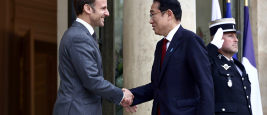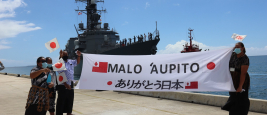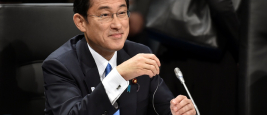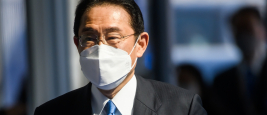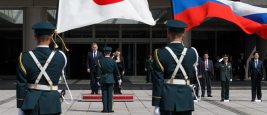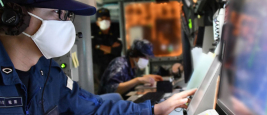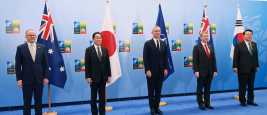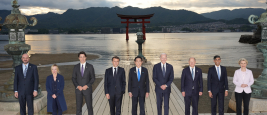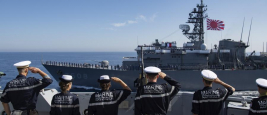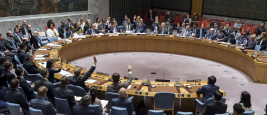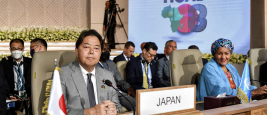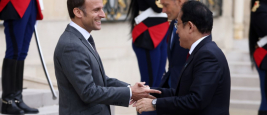Chinese President Xi Jinping's state visit to France hit the headlines. President Macron rolled out the red carpet to welcome his guest, hoping to convince China to limit its support for Russia and respect fair trade rules.

Japan
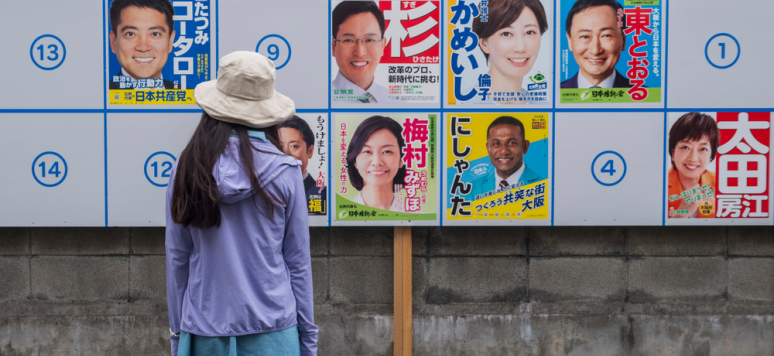
As the international system undergoes a major overhaul, Japan is emerging as one pillar of the multilateral rules-based order. Despite being often perceived as a declining country, it remains the world's third largest economy and, as a member of the RCEP, CP-TPP and the Japan-EU Economic Partnership Agreement, plays a key role in trade liberalization and norms shaping. In recent years, Tokyo has also demonstrated a proactive diplomacy, especially in the Indo-Pacific area where it is one of the core stakeholders. In this regard, Japan has become a major partner for Europe and for France.
Through its research activities, Ifri's Center for Asian Studies aims to provide a better understanding of Japan's action in the world and to foster the dialogue and cooperation between France and Japan.
Research Fellow, Head of Japan Research, Coordinator of the Program on Pacific Islands,
...
Research Fellow, Center for Asian Studies
...Senior Advisor, Center for Asian Studies
...As US-China rivalry reaches its peak and the likelihood of a high-intensity conflict in the region seems greater than ever, this report advocates for a pragmatic recalibration of France’s strategic posture in the Indo-Pacific. This adjustment should be grounded in a realistic reframing of...
Japan and the European Union are increasingly aligned on international economic policies, the product of a similar outlook toward China – concerned without being overtly hostile – and worried about over-reach by the United States.
Japan has recently stepped up its engagement with the Pacific Island Countries (PICs), building on its historical ties and strategic interests in the region.
In the current tumultuous geopolitical setting, Tokyo may have a very specific, stabilizing role to play.
Addressing remotely the 8th Japan-Africa TICAD Summit held in Tunis between August 27th and 28th, Japanese Prime Minister Fumio Kishida pledged $30 billion in public and private contributions to the African continent over the course of the next three years. This is a quite a remarkable...
Laying the foundation for the Eighth Tokyo International Conference on African Development (TICAD), Japanese Foreign Minister Yoshimasa Hayashi held talks on 28 March 2022 with ministers from 50 African nations. Hayashi expressed concerns that the COVID-19 pandemic and the war in Ukraine had...
The war in Ukraine has shaken the foundations of European security and of the global rules-based order. In many ways, Russia’s aggression has been a wake-up call for the EU, adding a sense of urgency to its ongoing transformation to becoming a stronger geopolitical actor, materialised by the...
The war in Ukraine has led to a major rift between Japan and Russia.
On December 18, 2018, the Japanese government issued its latest National Defense Program Guidelines (NDPG), marking another step in Japan’s defense planning and the readiness of the Japan Self-Defense Force (JSDF).
Is NATO going East? NATO and the cooperation with Indo-Pacific partners
In 2022, NATO acknowledged China's growing influence and military modernization as significant challenges, recognizing the Indo-Pacific region's strategic importance.
Economic Security and East Asia: De-risking in an Era of Strategic Competition Conference
Annual Conference of Ifri's Center for Asian and Indo-Pacific Studies. As strategic competition becomes an increasingly dominant feature of the international system today, the “de-risking” of interdependent economic ties has emerged as a new mantra for managing geopolitical uncertainty.
G7 Hiroshima Summit: What type of Japanese and European leadership in a fragmented world? Webinaire
The G7 summit in Hiroshima showcased a new international order in the making.
Japan as an Upgraded Strategic Player: What Implications for the Indopacific and the Cooperation with France? Webinaire
In December 2022, Japan updated its national security and defense strategies, marking a major shift in its capacity and willingness to act as a strategic player on the international scene.
Is the UN Security Council still relevant? France and Japan's views on the future of multilateralism Webinaire
The war in Ukraine exemplified the limitations of the UN Security Council (UNSC), as this key institution was not able to efficiently act for the maintenance of international peace and security.
After TICAD 8 - COVID, war in Ukraine and the cooperation with Africa: Views from Japan and France Webinar
The TICAD 8 – the 8th edition of the Japan-Africa Summit – was held on 27-28 August 2022 in Tunis.
Asia after the War in Ukraine: Re-imagining multilateralism and the risk of high-intensity conflict Hybrid Conference
Annual conference of Ifri's Center for Asian Studies. The war in Ukraine has marked the return of high-intensity conflict in Europe and represents a profound, structural shift in the region’s strategic environment. It also takes place against a backdrop of a decades-long...
Critical minerals: How to secure stable and resilient supply chains? Views from Europe and Japan Webinar
The war in Ukraine has highlighted once again the importance that stable supplies of critical raw materials play in building resilient supply chains.
How the war in Ukraine affects strategic foresight? Visions from France and Japan
The Russian aggression in Ukraine took most experts and policymakers by surprise and raised questions about the methodology of strategic planning and foresight.
Strategic autonomy and industrial policy: Perspectives from France, the EU and Japan
Building up a more sovereign Europe is one of the three main ambitions for the French Presidency of the EU.
Japan PM's low-key visit to Paris yielded significant bilateral initiatives. French President Emmanuel Macron rolled out the red carpet to greet Chinese President Xi Jinping this week, hoping to somehow persuade him to curb his country's support for Russia's war in Ukraine and to play by...
While the impact of Kishida’s tour is ‘marginal, it can still send ‘a message of solidarity’ that it intends to take the continent’s concerns seriously. Getting the African countries to take active measures against Russia will be difficult if they are not offered strong incentives in exchange,...
More realistic posture would strengthen Paris' role in Indo-Pacific region
One of Prime Minister Fumio Kishida’s top goals for next month’s Group of Seven summit in Hiroshima is to create a united front on issues like China and Ukraine. But finding a unified approach to dealing with Beijing’s assertiveness might have just become harder.<...>
Recent US military activity in the Asia-Pacific is on the rise, including drills in the Philippines and South Korea as well as a submarine deal struck between the US and Australia. China has, meanwhile, accused the US of encircling the country. FRANCE 24 speaks with an expert to shed light on...
Japan has been investing in the continent for longer than China and applies international standards to its infrastructure financing, analysts said. Its pockets may not be as deep, but its support of good governance and democratic principles makes it a tempting development partner for...
Japan, which began developmental programmes in the 1990s, has been eclipsed in recent years by China, now Africa’s leading trade partner.Pledge to invest US$30 billion on the continent includes a focus on training Africans to run their economy.
When Prime Minister Fumio Kishida becomes the first Japanese leader to attend a NATO leaders summit on Wednesday, he’ll be looking to stress the need for unity in preventing China from taking the “wrong lessons” from the Ukraine war as the bloc looks to expand its footprint in the Indo-Pacific...






